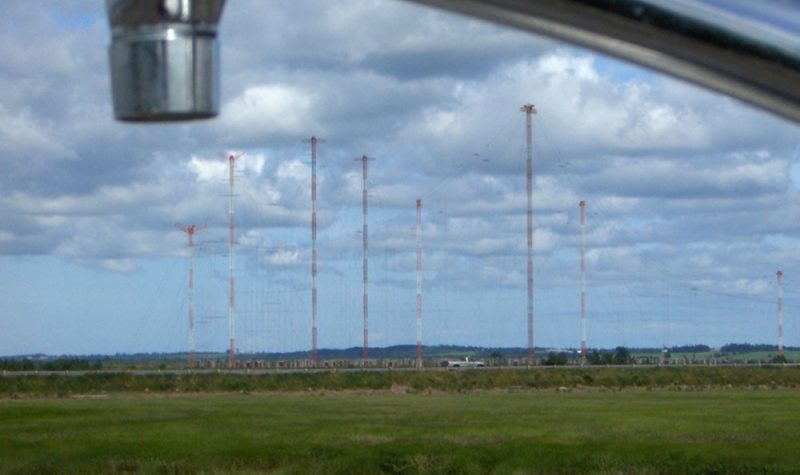Filmmaker Amanda Dawn Christie was on site in 2014 when the former Radio Canada International short wave radio towers on the Tantramar marsh were taken down. Christie filmed the towers and their demolition, and the images she captured are part of her 2016 film, Spectres of Shortwave, which screens this Thursday at the Vogue Cinema as part of the Sackville Film Society winter series.
Christie’s films didn’t start out to document the demise of the radio towers. Now based in Moncton, the artist lived in Sackville for many years, during which time she became more acutely aware of the RCI site, after learning to build her own radio receiver in a workshop at Struts Gallery.
“We made radio receivers out of toilet paper tubes,” recalls Christie, “and my radio picked up Italian radio. I thought that I did a great job!” But Christie later learned people in houses near, in and around Sackville had reported picked up radio signals in their sinks and refrigerators. “So it wasn't that I did a good job building a radio,” says Christie,” it was that I was near an international shortwave site.”
Christie was fascinated enough with the idea of short wave broadcasts picked up by sinks that she decided to construct another receiver in 2009, while working at Struts. Called the Marshland Radio Plumbing Project, Christie tried to make a functioning radio receiver out of a sink, using copper pipe as the antenna, two types of metal soldered together for the diode, and the sink basin as a sort of gramophone horn.
“I took it around the marsh trying to hear the radio,” says Christie, “and I went to the radio tower site a lot and talked with the technicians.”
That relationship with the staff at RCI came in handy years later, when the organization granted Christie access to the site during the filming of Spectres of Shortwave.
The artist was adventurous in collecting her footage of the towers, even going so for as to getting licensed to climb them. On the day they started toppling the towers in March 2014, Christie recalls racing to the site from Moncton, just missing the fall of the first of the towers.
She was standing in the parking lot of the facility when the second tower dropped. “I didn't even have a tripod. My camera was sitting on the bumper of the van that I was using.” The shot she captured is in the film. “When you see that tower fall, it's really close,” says Christie. “And you see the camera shake with the aftershock.” The snow that was on the ground absorbed some of the vibration of the fall, so the noise was less a crash and more a “kind of underwhelming thud”, says Christie. “It makes more noise as the metal is twisting and falling than when it hits the ground.”
Christie didn’t originally set out to document the demise of the Tantramar short wave towers. She started out with a plan to create a durational landscape film featuring the towers and the marshland they occupied throughout the seasons. But then before she had even started filming, CBC made their announcement, and suddenly Christie felt a responsibility to document the towers, and their destruction.
“Originally, I wanted this abstract soundscape, but because they were tearing the site down, I felt there was just more of an obligation to document it historically,” says Christie. There’s no “talking heads” in the movie, but plenty of voices and stories. Since the film is about radio, Christie wanted the soundtrack to double as a radio documentary. “So when you're in the movie theatre, think of it like listening to a radio documentary, while watching images of landscape.”
The radio quality of Christie’s film also means that every time she screens it, she arranges for a simultaneous broadcast on the radio somewhere else in the world. This time, while Spectres of Shortwave screens at the Vogue Cinema in Sackville, it will also be broadcast on the radio in Dawson City, Yukon.
“I feel like there's a connection between Sackville and Dawson City,” says Christie, pointing out that coincidentally the frequency for CFYT Dawson City is the same as that of CHMA Sackville, 106.9FM.
Planty of people who lived near the towers or drove by them regularly didn’t really understand their function, says Christie.
“To me they were just a landscape on the highway,” says Christie. “You know, you see them and you know you're almost home.”
But for 70 years, the towers broadcast the Voice of Canada out to the rest of the world, sending original Canadian content, and also relaying international content produced elsewhere.
The towers were first tested in 1944 and starting broadcasting in earnest in 1945.
“Sackville was the perfect location for broadcasting overseas because radio waves travel better over water,” says Christie. And the natural conductivity of the saltwater marsh meant no need to bury copper wire, like might be required at another site. “It was the perfect location during World War Two for them to be able to broadcast to Europe and Northern Africa, straight across the ocean from Sackville.”
After 2014, RCI International switched to strictly online streaming, relying on the internet instead of short wave technology. Christie says it was a big loss, and showed a lack of foresight, technologically. She points out the ease with which different states and governments can censor and control content over the internet. Meanwhile “shortwave radio almost always gets through,” says Christie. “It’s a lot harder to block and it's immediate.”
Spectres of Shortwave screens Thursday at the Vogue Cinema as part of the Sackville Film Society’s winter series. The film starts at 7:30 p.m., and tickets are $10 at the door.
Listen to the CHMA story below:


